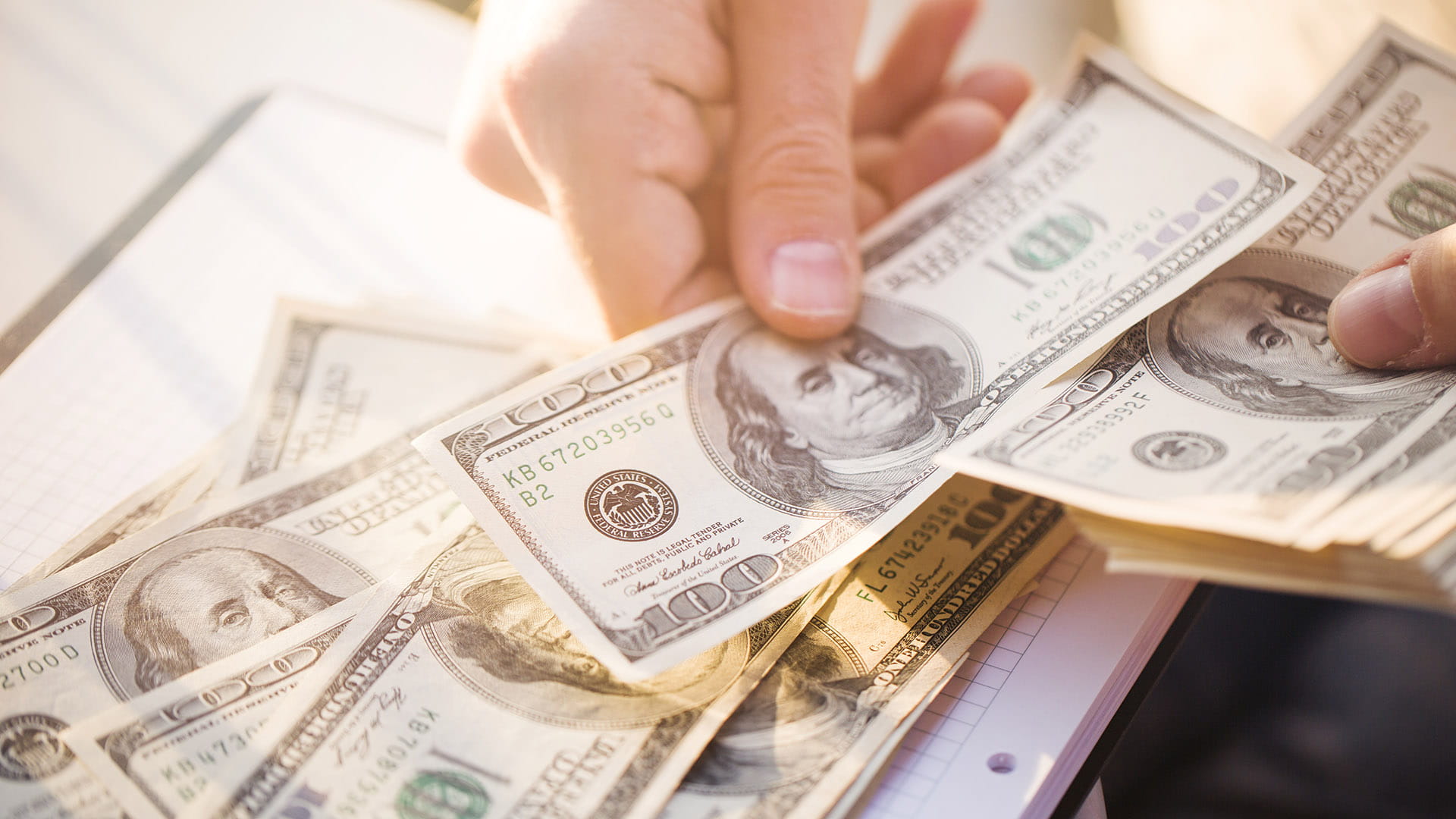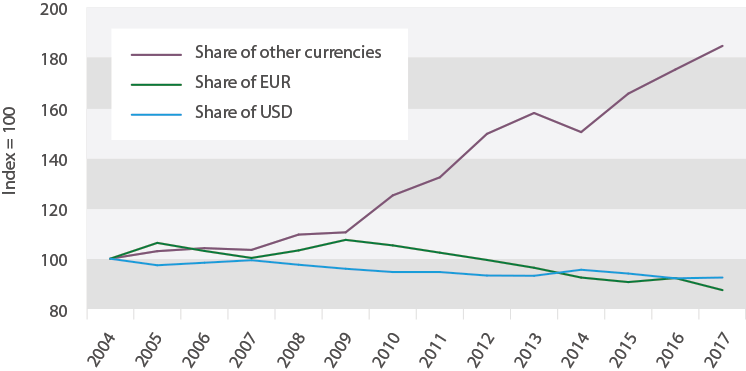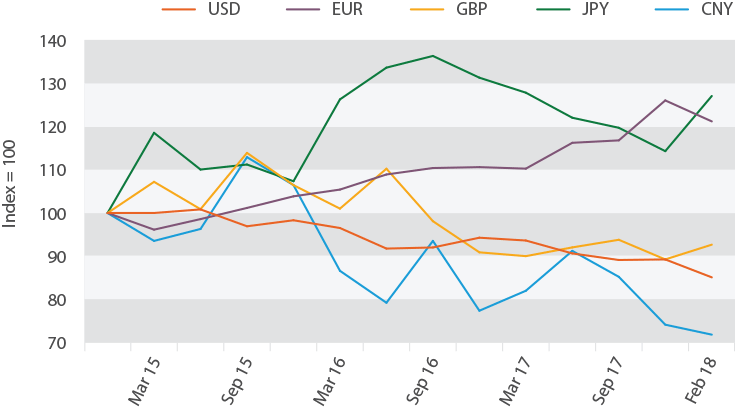
Summary
The US dollar has long been the currency of choice for banking and trade, and for valuing all other currencies. This has brought the US enormous economic benefits and significant structural downsides. Yet a shift away from the dollar may have begun, which could help the global economy in the long run.
|
Key takeaways
|
What would happen if the world stopped depending on the US dollar? There is growing evidence that after years of dominance, the dollar could be losing its status as the world’s reserve currency. Yet while a passing of the mantle could be painful for the United States, a more balanced reserve system – one that relies more on the euro, renminbi or yen – would likely help the global economy in the end.
Why do reserve currencies exist?
Throughout history, international traders and bankers have typically used one country’s currency as a default base of exchange. Over time, the Roman denarii, Venetian ducat and Dutch guilder each took its turn as the commonly accepted medium for trade, and as the basis for valuing all other currencies.
The British pound sterling was the currency of choice for international trade and value preservation from the mid-19th century until the mid-20th, when two World Wars and a Great Depression took their toll. Then sterling’s success story became a cautionary tale. Its share of currency reserves among international central banks fell from around 60% in the early 1950s to less than 5% by the mid-1970s, and its value fell from more than USD 4 per pound at the end of WWII to near-parity with the US dollar in the mid-1980s.
With the US dominating international politics during the post-War period, the dollar soon took the place of the pound and became the world’s reserve currency. This brought the US both enormous economic benefits and significant structural downsides:
- For decades, the US dollar has stayed relatively strong versus other currencies as investors have pushed up its value.
- Doing cross-border business has been easy for the US, given that effectively all major commodities are traded and settled in dollars.
- On the downside, the US has been forced to maintain a permanent current-account deficit – in this case, a massive trade deficit funded by selling its government bonds abroad – to maintain its reserve-currency status.
- Although this trade deficit has enabled US citizens to consume more than they produce, it has also placed downward pressure on US wages – particularly for people manufacturing tradable goods.
The dollar’s decline may have already begun
For a brief time around the turn of the millennium, there was some speculation about whether the euro would supplant the US dollar as the world’s dominant reserve currency. Yet since then, there has been little movement on this front as the global financial crisis and European debt crisis seemed to curb the world’s appetite for anything but the dollar’s relative safety.
In recent years, however, certain political events – such as the Brexit vote and the election of US President Donald Trump – have brought the dollar’s dominance back into focus. Many non-Americans have begun to notice how exposed they are to the protectionist US political activity that has been roiling global markets.
But this trend away from the US dollar predates the election of President Trump. As the accompanying charts show, central-bank reserves now hold fewer dollars than they did in 2004. Moreover, fewer SWIFT payments – the primary exchange for interbank fund transfers – are being done in dollars today than in 2015. (The euro is by far the next biggest currency for SWIFT payments in terms of overall volume, but there has been a shift to other currencies as well.)
Other currencies are gaining on the US dollar
World currency composition of official foreign-exchange reserves since 2004

Source: IMF. Data as at 31 December 2017. Chart shows world currency composition adjusted at average exchange rates, indexed to 100. “Other” currencies include RMB, JPY, GBP, AUD, CAD, etc.
Would the world be better off without “King Dollar”?
Many market-watchers believe it would be better for the global economy to have a more balanced international reserve system that relies less on any single currency. But the process of getting to this point would be a bumpy one, and it would have significant implications for both exchange rates and the cost of capital in different economies.
For the US, giving up reserve-currency status may help the country balance its trade relationships, but it would likely hurt the value of the dollar and create inflationary pressure on the prices of consumer goods. Ultimately, the United States’ loss of reserve-currency status may only limit any further decline in wages, and there is a good chance it would also make US consumers a lot poorer.
For other countries or regions – perhaps the euro zone, China or Japan – increased usage of their currencies would likely make their currencies stronger. This would improve their purchasing power for commodities and tradable goods, and it would lower the cost of capital for their domestic industries. However, these economies might also suffer further income disparity, since stronger currencies make unskilled labour pools less competitive.
Fewer payment are being made in dollars
Currency shares of SWIFT payments since December 2014

Source: SWIFT watch. Data as at 28 Feb 2018. SWIFT = Society for Worldwide InterBank Financial Telecommunications.
Investment implications of a shift away from the dollar
In the end, a country that boasts the world’s reserve currency will generally feel the positives more than the negatives. As a result, if the US dollar were to lose its reserve status, investors should anticipate a drop in the dollar’s exchange rate, a negative effect on US interest rates, and potential underperformance for US equities and fixed income.
On the flip side, any currency that replaces the US dollar would likely pass along the benefits of lower capital costs and higher purchasing power to its issuing nation. Just as a shift to the euro as reserve currency might give the euro zone a relative growth boost, a move toward the renminbi or yen would likely also help China or Japan.
As a result, we will be closely watching the statistics on reserves and international settlement to see if the initial trends away from the US dollar continue. Perhaps it’s only a matter of time until the dollar goes the way of the denarii, ducat, guilder and pound – and one or more upstarts rise to take its place.
Investing involves risk. The value of an investment and the income from it will fluctuate and investors may not get back the principal invested. Past performance is not indicative of future performance. This is a marketing communication. It is for informational purposes only. This document does not constitute investment advice or a recommendation to buy, sell or hold any security and shall not be deemed an offer to sell or a solicitation of an offer to buy any security. The views and opinions expressed herein, which are subject to change without notice, are those of the issuer or its affiliated companies at the time of publication. Certain data used are derived from various sources believed to be reliable, but the accuracy or completeness of the data is not guaranteed and no liability is assumed for any direct or consequential losses arising from their use. The duplication, publication, extraction or transmission of the contents, irrespective of the form, is not permitted. This material has not been reviewed by any regulatory authorities. In mainland China, it is used only as supporting material to the offshore investment products offered by commercial banks under the Qualified Domestic Institutional Investors scheme pursuant to applicable rules and regulations. This document is being distributed by the following Allianz Global Investors companies: Allianz Global Investors U.S. LLC, an investment adviser registered with the U.S. Securities and Exchange Commission; Allianz Global Investors GmbH, an investment company in Germany, authorized by the German Bundesanstalt für Finanzdienstleistungsaufsicht (BaFin); Allianz Global Investors Asia Pacific Ltd., licensed by the Hong Kong Securities and Futures Commission; Allianz Global Investors Singapore Ltd., regulated by the Monetary Authority of Singapore [Company Registration No. 199907169Z]; Allianz Global Investors Japan Co., Ltd., registered in Japan as a Financial Instruments Business Operator [Registered No. The Director of Kanto Local Finance Bureau (Financial Instruments Business Operator), No. 424, Member of Japan Investment Advisers Association and Investment Trust Association, Japan];and Allianz Global Investors Taiwan Ltd., licensed by Financial Supervisory Commission in Taiwan.
503336

Summary
Wealth and income inequality are pressing global issues, affecting the quality of life for countless people, suppressing economic growth, stretching governments’ capabilities and destabilising social systems. The good news? Politicians, corporations and investors can all do their part to enact change.
Key takeaways
|







